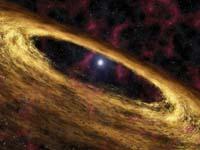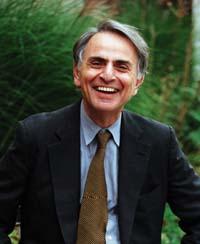Contact with the cosmos

They say that with the arrival of Viking 1 and Viking 2 spacecraft to Mars in 1978, the media barely paid attention to the news. This disinterest in the subject motivated Carl Sagan to perform the television program Cosmos. This program was followed by millions of people. Science drew people's attention.
Sagan was an astrophysicist of studies and profession, concerned with disclosure. He was passionate about science and outreach. He has said: "When you're in love you want to tell everyone, so it seems aberrant to me that scientists don't talk science." It is clear that he saw science and disclosure in the same hoop, he did not understand one without the other.
Sagan has published eleven books, articles and essays in his scientific outreach work. Many times the subject of epistemology was a great defender of the scientific method and, among other things, the theses against religion became famous -- religion is unfounded, faith, from the scientific point of view -. On many other occasions he directly addressed topics related to his topic, Astrophysics: The atmosphere of Venus and the greenhouse effect, such as planets in general and space travel.
Contact with aliens
In addition, Sagan's image was associated with exobiology for almost his entire life. To begin with, in 1966 he wrote Intelligent Life Off Earth with Shklovskii, a sign that already attracted him to the subject, and then wrote several works related to the subject. The last one was Contact on the SETI project to search for intelligent life off Earth.
Contact is a fiction novel (later adapted for cinema): a scientific woman receives signals from space, that is, she supposedly contacts intelligent beings outside the Earth. History is fiction, but written with great rigor. Sagan wanted to tell a story that can really happen and took care of the scientific issues in detail.
It must be said that the theme of the novel was close, as it was one of the great promoters of the SETI project. In fact, he was a very skeptical man, but he thought there is a great chance of living in a wide universe.

The greatness of the cosmos on TV
Sagan had very clear ideas. And the most successful support to make these ideas known to the world was television. With his documentary sessions Cosmos demonstrated that television was an unbeatable support for scientific subjects, taking advantage of undoubtedly images, sounds and imagination. To talk about Einstein's physics, for example, Sagan took a scooter and traveled at the speed of light.
The most advanced technology of the 1980s was the one they used to make Cosmos --which now images have become a bit obsolete and have renewed their thirteen sessions of Cosmos -. With the music they were right half and half: classics performed by great orchestras, unforgettable melodies by Vangelis...
The music helped, of course, but Sagan himself had the key to Cosmos's success. On television he reflected better than anywhere else his passion for science, and that media made him famous.





